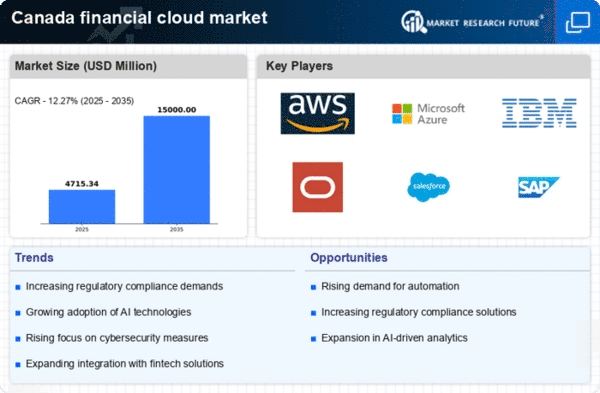Regulatory Compliance Demands
The financial cloud market in Canada is experiencing heightened pressure from regulatory bodies to ensure compliance with stringent financial regulations. Institutions are increasingly required to adopt cloud solutions that not only enhance operational efficiency but also adhere to legal standards. This demand for compliance is driving the adoption of cloud services, as organizations seek to mitigate risks associated with non-compliance. In 2025, it is estimated that compliance-related expenditures in the financial sector could reach $1.5 billion, indicating a robust market for cloud solutions that facilitate regulatory adherence. As financial institutions navigate complex regulations, The financial cloud market is positioned to grow, providing tools that streamline compliance processes and enhance reporting capabilities.
Enhanced Data Analytics Capabilities
The financial cloud market is being propelled by the growing need for enhanced data analytics capabilities among financial institutions. With the increasing volume of data generated, organizations are recognizing the importance of advanced analytics to derive actionable insights. Cloud solutions offer powerful tools for data processing and analysis, enabling firms to make informed decisions based on real-time data. In Canada, it is projected that the market for financial analytics solutions will grow by 25% annually, underscoring the demand for cloud-based analytics tools. As institutions strive to leverage data for competitive advantage, the financial cloud market is likely to expand significantly, providing essential resources for data-driven decision-making.
Cost Efficiency and Operational Agility
In the competitive landscape of the financial sector, organizations are increasingly turning to the financial cloud market to achieve cost efficiency and operational agility. By leveraging cloud solutions, financial institutions can reduce their IT infrastructure costs by up to 30%, allowing for reallocation of resources towards innovation and customer service. The ability to scale operations quickly in response to market demands is another compelling factor driving this trend. As firms seek to optimize their operational models, the financial cloud market is likely to see a surge in adoption, with many institutions prioritizing cloud investments to enhance their agility and responsiveness to changing market conditions.
Growing Demand for Remote Access Solutions
The financial cloud market is responding to the growing demand for remote access solutions, particularly as organizations prioritize flexibility and accessibility for their workforce. With an increasing number of employees working remotely, financial institutions are seeking cloud solutions that enable secure access to critical systems and data from any location. This trend is likely to continue, with remote access solutions projected to account for 30% of cloud service investments in the financial sector by 2026. As firms adapt to this new work environment, the financial cloud market is expected to expand, providing essential tools that facilitate remote operations while ensuring data security and compliance.
Collaboration and Integration Opportunities
The financial cloud market is witnessing a surge in collaboration and integration opportunities among various stakeholders in the financial ecosystem. As institutions seek to enhance their service offerings, partnerships with fintech companies and cloud service providers are becoming increasingly common. This collaborative approach allows for the integration of innovative technologies and services, fostering a more dynamic financial landscape. In 2025, it is anticipated that collaborative cloud solutions will account for approximately 40% of new cloud investments in the financial sector. This trend indicates a shift towards a more interconnected financial cloud market, where collaboration drives innovation and enhances customer experiences.
















